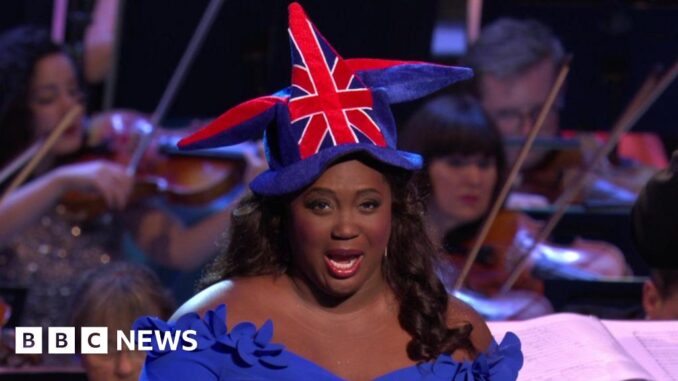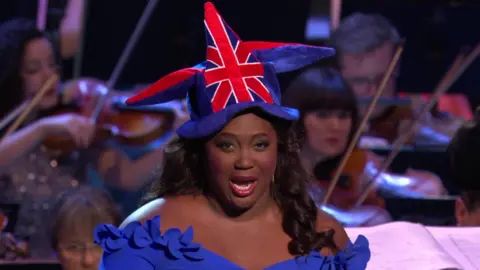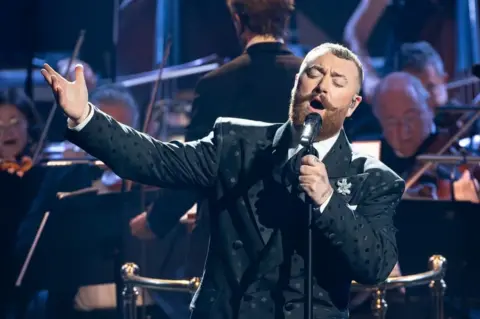
 BBC
BBCAmerican soprano Angel Blue stole the show at the Last Night of the Proms, with a series of playfully warm-hearted performances.
The singer sported a Union Jack jester’s hat for the traditional performance of Rule, Britannia! and blew kisses to the audience while singing Ruperto Chapí’s tongue-twisting comic operetta Las Hijas Del Zebedeo.
She also threw roses to her adoring crowd at the Royal Albert Hall, and coquettishly handed one to conductor Sakari Oramo, who gamely tried to lead the orchestra with it, until the stem broke.
“We’re all a little bit in love now, aren’t we?” said Radio 3’s Katie Derham. “She played that audience like a fiddle.”
The 40-year-old was making a belated debut at the concert, having originally been booked to play in 2022, before the evening was called off due to the death of Queen Elizabeth II.
She described returning to the Royal Albert Hall as “a full circle moment”, after getting some of her earliest career breaks at the English National Opera in London.
“I feel like all of my dreams have come true,” she said.
“I’ve had so many goals in opera, so many dreams that I’ve realised [but] I think this is the one that will top everything.”
‘Plush velvet’
Blue started singing at four years old after her parents took her to see a production of Turandot, and paid her way through UCLA music school by competing in beauty pageants – winning the titles of Miss Apple Valley, Miss Hollywood and Miss Southern California.
She won a Grammy for her recording of Gershwin’s Porgy And Bess in 2020; and hit headlines in 2022 after pulling out of a performance at Italy’s Arena di Verona in protest at the venue’s use of blackface make-up in a production of Verdi’s Aida.
Known for her dusky middle register and soaring, agile upper range, her vocals have been called “radiant,” “alluring,” “honeyed,” and like “plush velvet”.
Hugely in-demand, she’s compared her lifestyle to the Looney Toons’ character of the Tasmanian Devil, “constantly going, constantly moving, constantly having to perform”.
But there’s no doubt she’ll have to schedule a return to the Proms after Saturday’s stellar performance.
 Sonya Garza
Sonya GarzaThe Last Night capped off an eight-week season of 90 Promenade concerts, held in London, Gateshead, Belfast, Newport, Nottingham, Aberdeen and Bristol.
The evening kicked off in raucous style with William Walter’s Portsmouth Point – a spirited piece inspired by a seaside scene full of cavorting couples, drunken debauchery, a peg-legged fiddle player and a man wrestling a dog.
It matched the atmosphere inside the Royal Albert Hall, where eager Prommers waltzed, whistled, waved flags and popped confetti throughout the night.
They were rewarded with three works by Puccini, alongside Henry Mancini’s rinky-dink Pink Panther theme, and the traditional programme of sea shanties and patriotic songs like Jerusalem and Rule, Britannia!
World premieres included Carlos Simon’s Hellfighters’ Blues, a ragtime jazz piece that paid tribute to black servicemen in World War One; and Iain Farrington’s Extra Time, a mash-up of songs associated with TV sports programmes.
The spritely piece incorporated tunes from Match of the Day, Ski Sunday, Today At Wimbledon and Test Match Special, with the refrain of Chariots Of Fire chucked in for good measure.
As it played, the BBC Singers and BBC Symphony Chorus started a Mexican Wave while brandishing football rattles and tennis rackets.
Meanwhile, the night’s second soloist was pianist Sir Stephen Hough, who treated the audience to an impromptu version of Supercalifragilisticexpialidocious, from the film Mary Poppins.
The musician also joined Angel Blue in a new arrangement of the African-American spirituals He’s Got The Whole World In His Hands and Swing Low, Sweet Chariot.
Speaking on BBC One, the soprano explained she had specifically requested those two songs especially, as she used to sing them as a child with her sister “holding hands in her bedroom”.
Elsehwere, poet laureate Simon Armitage contributed a new work, simply called Proms Poem, that rhapsodised the magical and mysterious power of music.
“Music is all time and no time at all. In the split second gap between sound being made and sound being heard, eternity ends.“
End of an era
The concert also marked the swansong of Proms director David Pickard, who is stepping down after nine years at the helm.
Under his watch, the festival has expanded outside London and promoted works by black and female composers who had previously been overlooked.
He also programmed concerts dedicated to video game music, breakdancing and grime; as well as performances by pop stars like Sam Smith, Laura Marling and Florence + The Machine.
“We’ve tried to tap into the feeling that the boundaries of music are slightly breaking down,” he told BBC News.
“We don’t put things in silos in the way that we used to.”
 Andy Paradise / BBC
Andy Paradise / BBCThe lowlight of his tenure, he admitted, was the pandemic year of 2020, when the Proms were drastically cut back, and all concerts took place without and audience.
“But I’m very proud that we never lost a season,” Pickard said. “They kept going during the Second World War, so we kept going during the pandemic.”
The highlights of his final season included:
- The Aurora Orchestra‘s annual from-memory Prom is always a delight. This year the musicians tackled what many consider the greatest symphony ever written: Beethoven’s Ninth. Playing without sheet music (and without chairs), their performance was vivid and spell-binding.
- Florence + The Machine transformed their 2009 debut album into an orchestral symphony in the last week of the Proms. It was a perfect marriage of rock and classical music, with her tempestuous, baroque songs brought to life by Jules Buckley and his orchestra – including a rare appearance for the long-necked Theorbo lute.
- The all-star trio of cellist Yo-Yo Ma, pianist Emanuel Ax and violinist Leonidas Kavakos played a spellbinding night of chamber music. Featuring Brahms’ Piano Trio No 2 and a performance of Beethoven’s Archduke, teasing out new subtleties from familiar favourites.
- One of the most moving concerts of the season was the London Symphony Orchestra‘s performance of Britten’s War Requiem, led by their new chief conductor Antonio Pappano. An emblem of hope after mass destruction, it was delivered with devastating poignancy by soloists Allan Clayton, Will Liverman and Natalya Romaniw.
- One of the movie industry’s greatest ever composers, Henry Mancini, was honoured with a concert marking the centenary of his birth. Alongside classic themes like Henry Gunn and The Pink Panther, the evening saw Mancini’s daughter Monica singing Moon River – made famous by Audrey Hepburn in the 1961 film Breakfast at Tiffany’s.



Be the first to comment